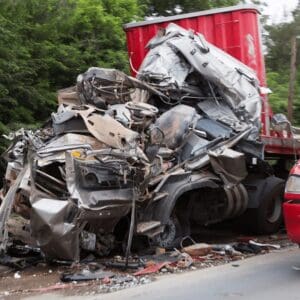5 Federal Trucking Regulations Companies Break Most Often
Federal trucking regulations are designed to prevent truck accidents, yet violations of Federal Motor Carrier Safety Administration (FMCSA) rules remain widespread throughout the industry.
In 2024 alone, FMCSA recorded over 5.15 million federal trucking regulation violations during roadside inspections, despite conducting fewer checks than the previous year. These numbers reflect a troubling pattern of companies that continue to prioritize speed and cost savings over compliance with safety standards.
The following five regulations are those most frequently violated by trucking companies nationwide, according to data from the FMCSA.
1. Hours of Service Violations
The Hours of Service rules under 49 CFR Part 395 limit the amount of time truck drivers can operate without rest. These regulations require an 11-hour driving limit within a 14-hour on-duty window, mandatory rest breaks, and weekly limits of 60 or 70 hours. Despite the 2017 mandate requiring the use of electronic logging devices, […]
Read MorePosted in Truck Accidents.
Georgia Truck Accident Lawyer
The Georgia truck accident attorneys at Munley Law have over 250 years of combined legal experience standing up to trucking companies and their insurers. With three board-certified truck accident attorneys on staff, we know the complex regulations that govern the trucking industry, and we know how to hold negligent drivers and companies accountable.
Our truck accident attorneys are leaders in the field of truck accident law. Our partners have spoken to attorneys across the country about truck accident litigation. A national award is named after our founder, Robert W. Munley, a pioneer in trucking law. When you work with Munley Law, you’re getting powerful advocacy, personalized attention, and a track record of multimillion-dollar results.
Contact us now to speak with a Georgia truck accident lawyer. With our expertise, we can guide you toward your next steps. You pay nothing unless we win.
Why Hire a Georgia Truck Accident Lawyer at Munley Law? […]
Read MorePosted in Truck Accidents.
What to Do If a Truck Leaves the Scene of a Crash?

Leaving the scene of an accident isn’t a wise decision. It is a crime that usually results in a more serious penalty than those usually imposed for causing an accident. A driver who flees an accident scene may lose his or her license and/or receive a prison sentence.
Yet, many drivers, in the heat of the moment, flee for various reasons. Sometimes, they may leave an accident site unintentionally, unaware that they have caused damage or injury.
Victims of hit-and-run truck accidents often suffer serious, even fatal injuries, especially if they were hit while walking or riding a bicycle. […]
Read MorePosted in Truck Accidents.
Why Board Certification Matters in Truck Accident Cases
Why Board Certification Matters in Truck Accident Cases
Truck accidents can be multifaceted cases, involving multiple parties, intricate federal regulations, and insurance companies that spare no expense defending their clients. To succeed, a lawyer must have more than general experience. They must possess extensive knowledge of trucking law and the skill to uncover the truth behind catastrophic crashes.
That is why board certification matters in truck accident cases. At Munley Law, our nation’s top-rated truck accident lawyers hold the distinction of being among the few in the country certified with the National Board of Trial Advocacy. This certification represents a higher level of skill, preparation, and commitment to victims of trucking collisions in Pennsylvania and nationwide.
What Does Board Certification Mean and Why Does It Matter?
Board certification is not an ordinary credential. It is a rigorous, peer-reviewed process that recognizes attorneys who have demonstrated advanced knowledge, […]
Read MorePosted in Personal Injury, Truck Accidents.
Idaho Truck Accident Lawyer
After a collision with an 18-wheeler, you may face an uncertain future with life-altering injuries. When others are to blame for your harm, you can rely on an Idaho truck accident lawyer from the highly qualified and compassionate team at Munley Law. To protect your interests and seek compensation for a full recovery, partner with the nation’s top-rated truck accident lawyers and show the at-fault parties that you mean business.
Why Choose Munley Law for Your Idaho Truck Accident Claim?
Munley Law is more than a local law firm serving clients in Idaho. Our team of attorneys is widely recognized in the field as one of the most accomplished teams for handling truck accident claims. We frequently consult with firms across the country, partly due to our certification in Truck Accident Law from the National Board of Trial Advocacy. […]
Read MorePosted in Truck Accidents.
How to Choose a Truck Accident Lawyer
Thousands of truck accidents happen across the United States every year, resulting in catastrophic injuries and fatalities. If you’re injured in a truck accident, you may need to seek compensation from the at-fault party. This could be just against a driver, but also could include multi-party liability cases and trucking company liability with massive transportation companies, typically protected by a team of lawyers with the sole purpose of protecting their best interests. You need to know how to choose a truck accident lawyer who will stand beside you throughout the process and defend your legal rights.
At Munley Law, our team of truck accident lawyers has represented injury victims nationwide for the past 65 years. We understand how trucking regulations and requirements affect accidents like yours and how to strategically position your claim so you receive the maximum possible settlement.
What Criteria Can You Use To Choose a Truck Accident Lawyer? […]
Read MorePosted in Truck Accidents.
Vestal Truck Accident Lawyer
Truck accidents on Vestal Parkway, Route 26, and nearby highways are serious and happen too often. If you or a loved one has been hurt in a truck crash near Vestal, it’s important to get the right legal help. A skilled Vestal, NY truck accident attorney can protect your rights and fight for fair compensation.
Truck crashes often lead to long hospital stays, expensive treatments, and lasting disabilities. They can affect not just the injured person but their family, too. Understanding your legal options can make a big difference in your recovery and financial future. Munley Law Personal Injury Attorneys can help — contact us today for a free consultation.
Why Truck Accident Cases Are Unique
Truck accidents are not like typical car crashes. Big trucks cause heavier damage. They are subject to special laws and safety rules that regular drivers don’t face. […]
Read MorePosted in Truck Accidents.
Missouri Truck Accident Lawyer
A truck accident can forever alter your life in one moment. You and your family may face numerous challenges on the road to recovery. The good news is that a Missouri truck accident lawyer can help you pursue compensation to offset the losses you have sustained.
For more than 65 years, Munley Law has been fighting to secure justice for our clients. We don’t back down from a fight. We are committed to protecting you and your rights. When you hire the Nation’s top rated truck accident lawyer, you can trust that you will be getting the service and representation you deserve.
How Does Munley Law Stand Up to the Trucking Industry On Your Behalf?
Munley Law is a team of skilled, experienced, and compassionate attorneys who fight for the results you deserve. We provide support and advocacy for your truck accident case. […]
Read MorePosted in Truck Accidents.
Kentucky Truck Accident Lawyer
A collision with a commercial truck can change your life in an instant. Whether it happened on I-75 near Atlanta, I-95 outside Savannah, or a rural highway in southern Georgia, truck accidents often leave victims with serious injuries, costly medical bills, and overwhelming uncertainty about what to do next. If you or a loved one has been injured in a truck accident anywhere in Georgia, you need experienced legal representation on your side.
At Munley Law, our nationally recognized truck accident attorneys have decades of experience standing up to trucking companies and their insurers. We know the complex regulations that govern the trucking industry, and we know how to hold negligent drivers and companies accountable. From Macon to Augusta, Columbus to Alpharetta, we represent truck accident victims across the state of Georgia.
Our team of truck accident attorneys are leaders in the field of trucking litigation. […]
Read MoreWhat Is Non-Trucking Liability Insurance and Does It Affect Accident Claims?
If you drive a commercial truck, chances are you’ve heard about non-trucking liability insurance. But what exactly does it cover — and how does it affect your accident claim if something goes wrong when you’re not on the job?
Whether you’re an independent owner-operator or leased to a motor carrier, understanding non-trucking liability can make a big difference in how an insurance claim is handled. Below, we’ll break it down in plain language.
What Is Non-Trucking Liability Insurance?
Non-trucking liability insurance (sometimes called NTL insurance) covers a commercial truck when it’s being used for non-business purposes. This type of policy is for drivers who use their truck outside of work hours — such as driving to the store or heading home after a delivery.
It does not cover:
- Hauling cargo
- Driving under dispatch
- Any trip related to work for a carrier
In short, […]
Read MorePosted in Truck Accidents.
Intrastate vs. Interstate Trucking: What Pennsylvania Drivers Need to Know
If you’ve been in a truck crash, knowing whether the truck was traveling intrastate or interstate matters. These two types of trucking may sound similar, but they’re treated very differently under the law. Whether you were hurt on a local road or a busy interstate, talk to a Scranton truck accident lawyer at Munley Law to understand your rights.
We’ve been representing victims of commercial truck crashes for more than 60 years. Our attorneys are nationally recognized for handling high-stakes trucking cases — including multi-million-dollar verdicts for clients in Pennsylvania and beyond.
Here’s how intrastate vs. interstate trucking can affect your case.
What’s the Difference Between Intrastate and Interstate Trucking?
Intrastate trucking refers to shipments that begin and end within the same state. The trucks and intrastate drivers involved in these deliveries never cross state lines, […]
Read MorePosted in Truck Accidents.
What Was the Worst Truck Accident in History?
When a 40-ton commercial truck collides with another vehicle or structure, the consequences can be devastating. Throughout American history, truck accidents have claimed thousands of lives, caused billions in property damage, and forever changed safety regulations. For Pennsylvania residents who share highways with over 30,000 commercial vehicles daily, understanding these historical incidents offers more than just a sobering reminder of danger—it provides context for current safety measures and highlights the ongoing need for vigilance.

Pennsylvania: A High-Risk Transportation Hub
Pennsylvania sits at a crossroads of major interstate highways, […]
Read MorePosted in Truck Accidents.
When a Trailer Breaks Loose: Your Rights After a Runaway Truck Accident
A runaway truck, a detached trailer, or a dropped load can cause devastating accidents. These crashes often happen without warning and can leave drivers and passengers with life-changing injuries. Yet these can also be complicated cases for victims looking for justice, and plaintiffs require formal legal advice from expert truck accident attorneys.
If you or someone you love was hurt in a runaway truck or trailer detachment accident, you may be able to seek compensation. At Munley Law, our trailer detachment accident lawyers help crash victims in Pennsylvania and beyond.
Can I File a Personal Injury Claim for a Trailer Accident?
If you were injured because a trailer detached or a trucker lost control, you may have a valid personal injury claim. Depending on the details of the accident, the trucking company or others could be held liable. This includes accidents caused by:
- Faulty hitches or coupling devices
- Poor truck maintenance
- Overloaded or unbalanced trailers
- Driver error or reckless driving, […]
Posted in Truck Accidents, Workers' Compensation.
Whose Insurance Pays in a Truck Accident In Carbondale, Pennsylvania?

Understanding who pays truck accident claims that Carbondale residents face is crucial because multiple insurance policies may apply to a single accident. The complexity increases when accidents occur on busy routes like Interstate 81, which runs through Carbondale and sees heavy commercial truck traffic daily. Pennsylvania truck accident insurance laws create a specific hierarchy of responsibility that determines which insurance carrier pays first, second, and potentially third for your injuries and damages. […]
Read MorePosted in Truck Accidents.
What Are The Average Truck Accident Settlement Amounts in Carbondale, PA?

Truck accident settlements are five to ten times higher than car accident settlements due to federal insurance requirements and the severity of injuries typically involved. While car drivers only need $25,000 in minimum insurance coverage in Pennsylvania, commercial trucks must carry between $750,000 and $5 million in insurance coverage, depending on the type of cargo they transport. This substantial insurance coverage exists because truck accidents often cause severe injuries requiring extensive medical treatment and significantly lost wages.
However, it’s crucial to understand the financial reality of how much an average truck accident settlement is worth. […]
Read MorePosted in Truck Accidents.
How to Choose the Best Truck Accident Lawyer in Hazleton, PA

It’s important to remember that time works against you from the moment your truck accident occurs. Electronic logging device data from commercial trucks automatically deletes after just 30 days, surveillance footage from businesses along Interstate 80 and Interstate 81 gets overwritten quickly, and witness memories fade rapidly. The lawyer you choose must have the experience, resources, and local knowledge necessary to preserve crucial evidence while building the strongest case for maximum compensation.
Understanding how to choose a truck accident lawyer Hazleton residents can trust with their financial future requires examining several critical factors that separate true truck accident specialists from attorneys who merely claim this expertise. […]
Read MorePosted in Truck Accidents.
Most Common Truck Accident Injuries in Hazleton

The most common injuries sustained when a truck accident occurs in Hazleton include traumatic brain injuries, spinal cord damage, severe burns, multiple bone fractures, internal organ damage, and psychological trauma. These injuries often occur simultaneously, creating complex medical situations requiring immediate emergency care and specialized treatment. The mountainous terrain around Hazleton and the heavy volume of commercial traffic on Interstate 81 contribute to the severity of these accidents, […]
Read MorePosted in Truck Accidents.
Most Common Truck Accident Causes in Hazleton, PA
Truck accidents in Hazleton, Pennsylvania, occur at an alarming rate. Recent PennDOT statistics show that Luzerne County experiences some of the state’s highest commercial vehicle accident rates. Hazleton sits at the crossroads of several major trucking routes, including Interstate 81, Route 309, and Route 924. It is a critical hub for commercial vehicle traffic moving goods throughout Pennsylvania and the Northeast. The city’s industrial landscape, featuring numerous distribution centers and the expansive CAN DO industrial parks, means heavy trucks are constantly navigating through highway and local road systems. This constant flow of commercial traffic, combined with challenging geographic conditions and weather patterns unique to northeastern Pennsylvania, has made understanding truck accident causes in Hazleton, PA, essential for drivers and accident victims seeking legal representation.
When these massive tractor-trailers weighing up to 80,000 pounds collide with smaller vehicles such as passenger cars, the results are often catastrophic. […]
Read MorePosted in Truck Accidents.
Proving Negligence in A Hazleton Truck Accident
The aftermath can be overwhelming when a massive commercial truck collides with your vehicle on Interstate 81 or Route 309 in Hazleton. Beyond dealing with serious injuries and property damage, you face the complex legal challenge of proving negligence in your truck accident case. Understanding how to establish fault is crucial for securing the compensation you deserve under Pennsylvania law.
Proving negligence in a Hazleton truck accident requires more than showing that an accident occurred. You must demonstrate that the truck driver or trucking company failed to meet their legal obligations, causing injuries and damages. This process involves gathering specific evidence, understanding federal trucking regulations, and navigating Pennsylvania’s legal system with precision and expertise. That is why you need a Hazleton truck accident lawyer like the ones at Munley Law to help you recover compensation owed from injuries sustained in a tractor-trailer accident.
What Constitutes Negligence in Hazleton Truck Accidents

Posted in Truck Accidents.
Jim Thorpe Truck Accident Lawyers
If you or a loved one was hurt in a truck crash in Jim Thorpe, you’re not alone. Truck accidents are serious. They often lead to life-changing injuries and lengthy recoveries. You deserve support, answers, and justice.
At Munley Law, our Jim Thorpe truck accident lawyers are here to guide you every step of the way. We’ve helped truck crash victims across Pennsylvania recover millions, including a record-setting $26 million truck accident settlement. Let us help you, too. Contact us for a free consultation.
Do I Have a Truck Accident Case?
If a truck driver, company, or another party acted carelessly, you may be owed money. You might have a case if:
- You were hurt in a crash involving a large truck
- The accident was not your fault or only partly your fault
- Your injuries led to medical bills, […]
Posted in Truck Accidents.










